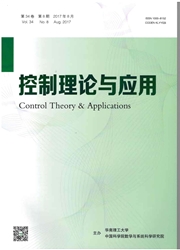

 中文摘要:
中文摘要:
为了强化非基因信息的传承与利用,提出一种非达尔文效应多目标免疫算法(non-Darwin effect multiobjective immune algorithm,NDIA).首先,利用区间记忆变异矩阵来保存进化中成功变异的区间信息,以引导后续的进化操作,加强局部搜索能力.其次,算法使用Pareto排序来选择非劣解.当非劣解的数量超出预设规模时,利用拥挤距离进行排序来选择相对稀疏的抗体保留.最后,算法对最后的非劣解集进行删减时设计了均匀度增强算子,通过多次拥挤距离的排序反复删减最拥挤的抗体,从而提高非劣解集在目标空间上的均匀性.通过多目标测试函数的仿真试验,与经典的多目标进化算法相比,新算法得到的最终解集在覆盖性、收敛性和分布性均有明显的改善,并能更好地逼近理论Pareto前沿.
 英文摘要:
英文摘要:
In order to strengthen the heritage and the exploitation of the non-genetic information, we propose the non- Darwin effect multi-objective immune algorithm (NDIA). Firstly, the range memory mutation matrix is used to store the information of the successful mutation range and then to guide subsequent evolution operations, which strengthens the ability of local search. Secondly, the algorithm uses Pareto order to choose non-inferior solutions. When the number of non-inferior solutions is bigger than the preseted value, the order constructed based on the crowded distance is applied to choose the relatively sparse antibody. Finally, the algorithm defines a homogeneous degree enhancement operator to reduce the final non-inferior solutions, and the homogeneous degree in the target space is increased after the repeated deletion of the most crowded antibodies. Based on the results of the simulation tests on several multi-objective optimization problems and the comparison with many classical methods, the resulting set of solutions provided by the proposed method is greatly improved in the spread ability, convergence, diversity, and can converge to global Pareto optimal front quickly.
 同期刊论文项目
同期刊论文项目
 同项目期刊论文
同项目期刊论文
 期刊信息
期刊信息
